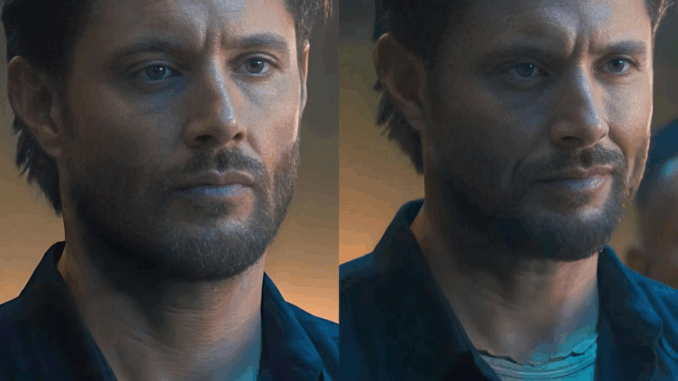
When Tracker first premiered on CBS, audiences expected a high-octane survivalist thriller with Justin Hartley in full command of his rugged charisma, a man using his sharp instincts and unique upbringing to help families find missing loved ones. What they didn’t expect was just how far the series would be willing to push both its protagonist and its loyal fanbase into darker, more disturbing emotional territory. The most recent episode did exactly that — a gut-punch of storytelling that has left viewers shaken, stunned, and questioning whether they’re even ready for what comes next.
From the very first moments, there was something unsettling in the air. Colter Shaw (Hartley), normally confident and calculating, found himself embroiled in a case that didn’t just test his survival skills but clawed at his very moral code. Instead of a straightforward chase or mystery, the episode unfolded with a slow-burn tension, culminating in revelations that hit harder than anything fans have seen so far in the series. And it wasn’t just the shocking events onscreen that struck a nerve — it was the emotional brutality, the raw sense of loss, and the creeping dread that seemed to hang over every frame.
On social media, the reaction was immediate. Fans flocked to X (formerly Twitter), Reddit, and TikTok to vent their emotions, with one viewer writing, “I thought I was ready for a darker Tracker, but this? This episode wrecked me.” Another added, “I signed up for survival and adventure, not emotional trauma. That ending destroyed me.” Many called it the show’s “darkest hour,” while others argued it was the turning point that elevated Tracker from procedural drama to prestige-level storytelling.
So what made the episode so disturbing? Part of it lies in how personal the case felt. The writers pulled Colter deeper into a mirror of his own fractured family history, forcing him to confront long-buried fears while trying to protect someone else from the same fate. Instead of the usual puzzle-solving and action sequences, viewers were given an unflinching look at trauma, manipulation, and moral gray areas. By the time the credits rolled, the line between Colter’s mission and his own emotional survival had blurred beyond recognition.
For Justin Hartley, this kind of material seems tailor-made. Long praised for his ability to balance toughness with vulnerability — honed during his years on This Is Us — Hartley delivered what fans are already calling his most powerful performance of the series. One critic online noted, “Hartley didn’t just play Colter this week. He embodied every ounce of his pain. It was haunting.” His ability to anchor the darkness without losing the humanity of the character has only reinforced why CBS bet big on him as both the star and executive producer.
But the intensity of the episode has also sparked debate. Some fans worry that Tracker risks alienating its core audience if it leans too heavily into bleak territory. After all, part of the show’s appeal lies in its balance of suspense and resolution, a sense of hope that no matter how messy things get, Colter Shaw can set them right. If the darkness becomes overwhelming, will viewers stick around? Or has the creative team found exactly the edge they need to keep fans invested long-term?
Behind the scenes, producers have hinted for months that Season 3 (and beyond) would take Colter into uncharted waters. Showrunner Ken Olin teased that upcoming episodes would be “more personal, more dangerous, and more unpredictable,” and this latest storyline appears to be just the beginning. Insiders suggest that the darkness is not a one-off, but part of a larger arc that could redefine the show’s identity going forward.
Even Hartley himself has acknowledged the shift. In recent press interviews, he admitted that Tracker would start exploring not just external survival, but the internal scars Colter carries. “This guy is not invincible,” Hartley explained. “He’s a product of trauma, and sometimes that trauma makes you strong, but sometimes it breaks you. We’re going to see both sides of that this season.”

The gamble seems to be working. Ratings for the episode held strong, with CBS reporting that live viewership and streaming numbers combined to make it one of the show’s most-watched installments yet. But the bigger story is the cultural impact — the fact that fans aren’t just watching Tracker, they’re dissecting it, arguing over it, and in some cases, even warning newcomers about how emotionally taxing it can be. One fan’s viral post summed it up best: “If you’re about to watch this week’s Tracker, prepare yourself. It’s not just TV. It’s a psychological punch to the gut.”
What remains to be seen is how the show builds from here. Will Colter find healing in the darkness, or will the writers continue to unravel him piece by piece? Will the fanbase embrace the shift toward heavier storytelling, or will some long for the earlier balance of adventure and mystery? Either way, the conversation surrounding Tracker has never been louder.
For now, Justin Hartley and his creative team seem content to keep audiences off-balance — making Tracker not just another CBS procedural, but a drama that dares to push boundaries. And as fans ask if they can handle more after this disturbing episode, the real question may be: can they afford to look away?
Because if this is only the beginning of the darkness, then Colter Shaw’s journey — and the emotional endurance of Tracker’s fans — is about to be tested like never before.